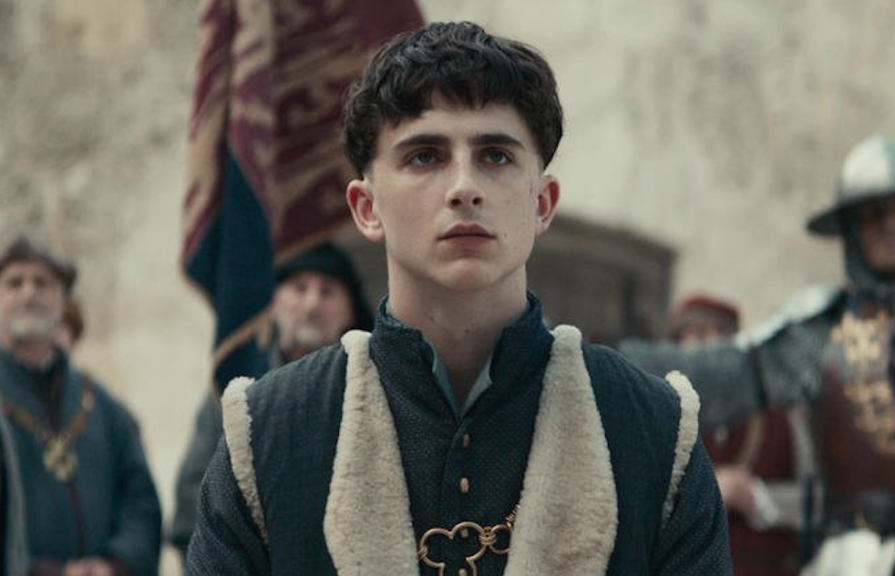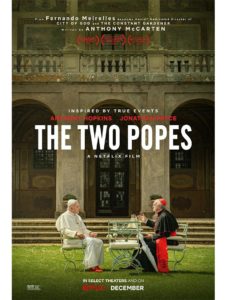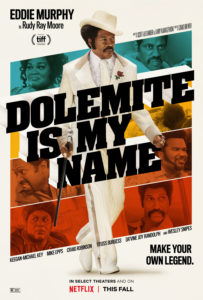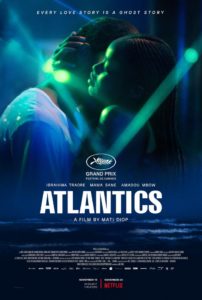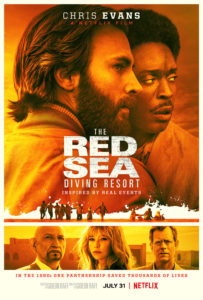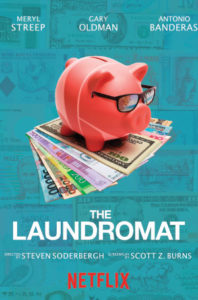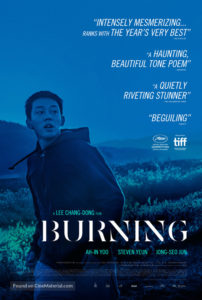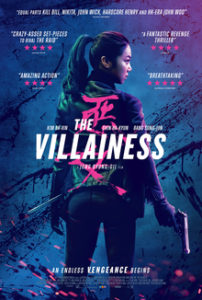The Two Popes
On the face of it, this strikes me as strange material for Fernando Meirelles to approach. The Brazilian filmmaker responsible for City Of God and The Constant Gardener is a visionary of colour and kinetics, of movement. Why would he choose to tell the story of two senior citizens having a conversation, his first feature since 360 in 2011? I understand he’s a Catholic, so maybe that explains it. He finds ways to bring this project much of his recognized style, the saturated hues and dynamic editing, especially in two separate depictions of papal conclaves, one that elected Joseph Ratzinger (Anthony Hopkins) to be Pope Benedict XVI in 2005. Years later, he meets with Cardinal Jorge Bergoglio (Jonathan Pryce), who wants to resign from his post in the Church, but Benedict has other plans for him. The colours of the Sistine Chapel pop off the screen.
Meirelles utilizes flashes back to Bergoglio’s younger life, going back to the mid-’50s and the late ’70s and ’80s (with Juan Minujín standing in as his younger self), and revealing his guilt and regret. The flashbacks are a narrative plow, slowing down the film’s forward motion into the storytelling mud, and a well-meaning but didactic thread at the end of the second act is way too on-the-nose, while every moment spent with Hopkins and especially Pryce, who does some of his finest work, is terrific. I love the scene where they drink Fanta and eat Vatican pizza—if that was the whole movie, it would’ve been very, very good.
Dolemite Is My Name
Weighted by the long absence of Eddie Murphy, not from the screen as much as from anything on the screen worth watching—with the possible exception of his Donkey in the first couple Shrek movies—this Rudy Ray Moore biopic arrives with Murphy for the first time playing to his middle age, leading with his belly. It’s so much fun to see him genuinely engaged, and it’s easy to see why Moore’s fearlessness lit a fire under his ass. The blaxploitation legend Moore, with all odds against him, became a stand-up storyteller, a touring and recording artist, and eventually movie star. As he says, “I willed myself into being a comedian. I willed myself into being a singer. How come I can’t be in the movies?” The picture also provides another career resuscitation—Wesley Snipes—with a cadre of talent shining in support, including Craig Robinson, Keegan-Michael Key, and Da’Vine Joy Randolph. What it’s really about is the magic of movies, and how enthusiasm and friendship and dreams are more important than talent, and in that it’s more or less an African-American version of Tim Burton’s Ed Wood, which is one of the highest compliments I can pay.
Atlantics
The first feature film from Mati Diop is a impressively original work. It first presents as a fairly straightforward boy-loves-girl-but-girl-is-promised-to-another story set in dusty, beautiful Dakar, Senegal. But the film ends up using supernatural threads to help illustrate the impact that members of the community setting out for a better life in Europe has on those left behind, especially when the journey to the promised land is filled with perils.
While some of the script and a few of the performances are raw and/or semi-formed, Diop directs a remarkable vision of the West African city—the ocean water, and the sky at night. It’s not often I recommend a film for its cinematography above all else, but Atlantics is simply, hypnotically beautiful to look at, and that production value elevates it above its flaws.
The Red Sea Diving Resort
The Men-On-A-Mission movie is a fallow genre, popular back in the 1960s and 1970s, so to have two show up suddenly like buses feels especially weird—the other recently being Triple Frontier. When you also consider the terrorist thriller Seven Days in Entebbe, which has some parallel themes, this might qualify as a resurgence. I’ve got some nostalgia for the genre, but it’s fraught with political issues—colonial nostalgia, corporate oppression, racism—that these films need to address head-on in order to deliver the requisite thrills. The Red Sea Diving Resort misses the boat.
Set in 1979, it tells the true story of a group of Israeli agents who moved Ethiopian Jews across the Sudan to an abandoned hotel on the Red Sea, and from there to waiting ships (and occasionally planes) to take them to Israel. The driving force behind this crazy plan was Ari Levinson, played by Chris Evans. He gets decent support from the very busy Michael K. Williams, Alessandro Nivola, Greg Kinnear, Ben Kingsley, Haley Bennett, Michiel Huisman, and Alex Hassell.
This picture feels like its heart is in the right place, written and directed by Israeli TV dramatist Gideon Raff, but even if it had come out when it’s set, back when these movies were popular, it still would’ve felt like an also-ran. The script and general levels of suspense never achieve even what, say, Argo-levels of excitement, to reference another film with parallel dramatics. Even Evans’ movie-star charisma can’t lift it up.
The Landromat
A raucous economic crisis comedy cut very much from the same cloth as The Big Short, based on the true stories, and secrets, of the Panama Papers. Director Steven Soderbergh brings all his filmmaking brio and brinkmanship to bear—in his second film for Netflix in 2019 following High Flying Bird—to bring this story (by Scott Z Burns, from a book by Jake Bernstein) of offshore tax shelters, shell companies, and fraud. It zigs and zags through multiple characters and scenarios, emceed by Antonio Banderas and Gary Oldman (with a fairly convincing German accent) as key players, who lead us through the ins and outs of the wealthy people who know all the tricks on how to avoid taxes. The core character—who disappears for swaths, but is still the heart of the thing—is Ellen Martin (Meryl Streep, who along with her work on Big Little Lies, is covering the bases on frumpy, determined seniors).
Her husband (James Cromwell) drowns in a boating accident, but the insurance company is one of these shadow companies that can’t pay its bills, leading Ellen to try to uncover what’s actually happening with these fraudsters. But this is carnival time compared to, say, Erin Brockovich, it’s much more a broad comedy fueled by outrage, with a big reveal in the final minutes if you didn’t get the message before then. Soderbergh can draw big names in small parts, which helps make it work, including Jeffrey Wright, Sharon Stone, Will Forte, and Matthias Schoenaerts, but the movie’s absolute sweet spot is a mid-movie sidebar about money, discretion, and infidelity, starring Nonso Anozie, Miracle Washington, Jessica Allain, and Nikki Amuka-Bird.
The Command
The Kursk was a Russian nuclear submarine that sank in August 2000. In the days following, the Russian Navy and government were criticized for their secrecy and slow response in attempts to save the stricken seamen. The film starts in some godforsaken Russian port town where the sailors haven’t been paid in weeks, and one is getting married—echoes of The Deer Hunter. Matthias Schoenaerts is the one of the submariners in charge, with his pregnant wife Léa Seydoux providing the appropriate anxiety and despair on dry land, while Max Von Sydow growls and Colin Firth furrows his brow at how his career is taking a Michael Caine-in-the-early-’80s turn. Director Thomas Vinterberg (whose recent films have included the excellent The Commune, Far from The Madding Crowd, and The Hunt) fills his cast with Danes, Swedes, Germans, and French to play Russians, with the accompanying mismatched accents. While he works hard to sustain the suspense, it’s deeply undercut if you already know the story of the Kursk, and it’s got nothing on the series Chernobyl for showing the horrific intransigence of Russian bureaucracy in the face of disaster.
The King
Australians David Michôd (Animal Kingdom) and Joel Edgerton brings us this very serious adaptation of Shakespeare’s Henry IV, Part 2 and Henry V, removing much of the Bard’s language in a somewhat plodding period drama alleviated by the occasional scene of beheading and armoured combat. Newly crowned King Hal (Timothée Chalamet) isn’t the warmonger his father (Ben Mendelsohn) was, but he’s drawn into a conflict with France anyway, hiring his drinking buddy Sir John Falstaff (Edgerton) as his advisor, along with a serpentine William Chief Justice (Sean Harris).
These period epics usually live or die on two elements: The first is scale and scope—a budget that allows the history to come alive on the battlefields and in the gorgeous sets and costumes. The second is in the heat of an incendiary central performance. Ideally in a film like, say, Elizabeth, or MacBeth, it’ll have both. The King, while being handsome, has a single remarkable battle and not much of the other stuff—an underplaying Chalamet wanly produces a few fine moments, but doesn’t have the strut nor the scenery-chewing energy to be a plausible, inspiring figure. In one scene where he’s supposed to be rallying the troops he looks like a kid having a fit.
Fortunately, Harris and Egerton both glower mightily through their whiskers. A real joy is the late-arriving Robert Pattinson, who with an outraaageous French accent is the only one having any fun. He makes it worth watching, but otherwise I might point Netflix viewers towards an alternative, another American coming across the pond for a role where he wears a metal bucket, Chris Pine, in 2018’s much stronger Outlaw King.
Burning
This came out in 2018, winning the directorial prize at Cannes. It’s from Lee Chang-dong, based on a short story by Haruki Murakami—a slow, gorgeous drama, one that keeps threatening to step into other genres. It’s both meandering and demanding, the gorgeous cinematography being a genuine highlight.
A lonely writer (Yoo Ah-in) doesn’t do much writing—he’s more a farmer taking care of the ranch while his father goes through the court system for a charge of assault. He meets someone who he knew as a child, someone he can’t remember. She (Jeon Jong-seo) remembers him, though, and they start a romance before she leaves on a trip to Africa. When she gets back, she brings someone she met in Kenya, Ben (played by Steven Yeun from The Walking Dead.) Then we get a bit of a love triangle, but it reverts to a mystery again in the last act. The ending is powerful, with a defining act revealing a lot more about the lead character than we’d really understood up to that point.
The young actors are all great, and good looking. It’s a beautiful movie, but what does it all mean? Is it about the unreliability of memory? Or is it about class? A little confounded, I checked out a few other reviews of the film. Words like “simmering” have been used, “Slow-burn suspense” and “intriguing enigma.” In other words, other critics have no idea what it’s about either.
In the end, I found Yoo Ah-in’s character is a little too bland, a little too lost, to be completely engaged in the film, but there’s no doubt in my mind this is what the filmmaker wanted—ask the question and just let it hang there.
The Villainess
Here’s a South Korean action picture for people who’ve tapped into John Wick but are missing that kinetic thrill in between sequels. The opening sequence sets the tone, as if the filmmakers looked at the action thriller Oldboy, specifically the fight sequence in the hallway, and thought, “this would be better if it was done in Point-of-View.” So, that’s what they did.
This is even more jittery and intense than Wick, as we jump backwards and forward in time to explore the life of a woman who was trained as an assassin in her youth, but later in life is captured by the South Korean intelligence agency, where she excels at any and all forms of combat, eventually going under cover as an actor. This is complicated somewhat by the fact the new recruit is the mother to a child.
There’s plenty here that will be familiar to anyone who remembers Luc Besson’s La Femme Nikita, and at times the swooping, vertiginous camerawork isn’t a far cry from the Russian action picture, Hardcore Henry. Otherwise, the drama is fairly hackneyed, but it’s never too long before another impressive action sequence forwards the plot. The final fight on a speeding bus is really something to see.





